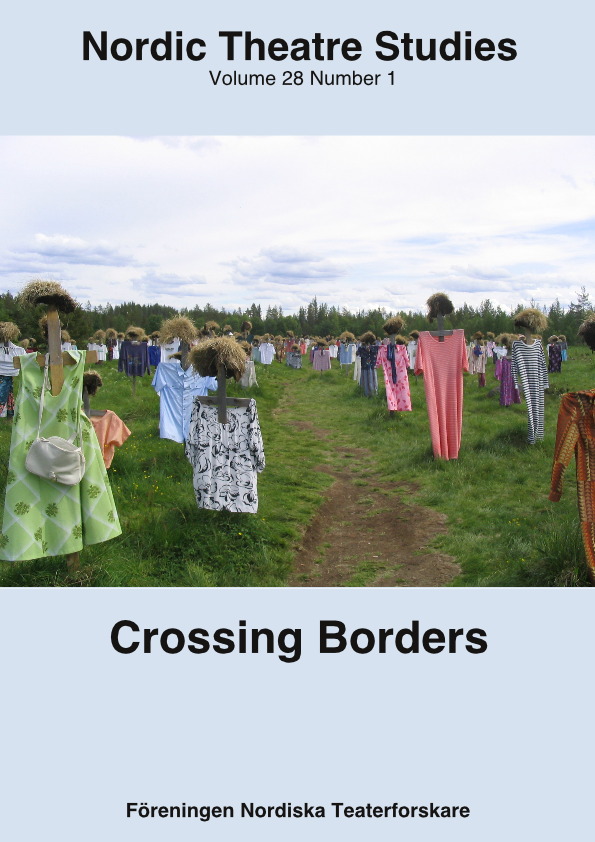Beyond the Gaze. Translations as a Norm-Critical Praxis in Theatre for Children and Young.
DOI:
https://doi.org/10.7146/nts.v28i1.23976Keywords:
Theatrical translation, feminist translation theory, norm critical pedagogy, desire, children’s theatre, youth theatre, gender, sensorium, agential realism, materialismAbstract
This article is based on the project Experimental theatre:. Intersectional encounters between dramatic art, school and academia, financed by the Swedish Research Council. It is an action research project on interactive dramatic art based at ung scen/öst (Östgötateatern), an experimental theatre group for children and young people.. with Malin Axelsson is the group’sas artistic director. Project manager Anna Lundberg has a background in drama studies and gender studies.
The troika of dramatic art-school-academia provides an empirical focus, coupled with a closer analysis of the artistic processes between children and adults based on productions by ung scen/öst.
What happens with the staging when the method involves open collaboration and shared learning? How is knowledge and meaning negotiated in artistic endeavours The project includes two performances and a publication. The project received financial support from the Swedish Research Council for the period 2012–2013.
This article focuses on translation practices at ung scen/öst, the creative processes within the project built by the group as a form, i.e. director, ensemble (actors), researcher and other members of the artistic team exploring ideas and expressions and creating theatre together.
References
Karen Barad, Meeting the Universe Halfway: Quantum Physics and the Entanglement of Matter and Meaning, Duke University Press, Durham and London 2007.
Kalle Berggren, ”Degrees of intersectionality: Male rap artists in Sweden negotiating class, race and gender”, Culture Unbound. Journal of Current Cultural Research, 5, 2013, p. 189-211.
Janne Bromseth, “Learning the Straight Script: Constructions of Queer and Heterosexual Bodies in Swedish Schools”, in Body Claims, Janne Bromset, Lisa Folkmarson Käll, Katarina Mattson (eds.), Uppsala University, Uppsala 2009.
Janne Bromseth and Renita Sörensdotter, “Norm-critical pedagogy”, Gender Studies Education and Pedagogy, Anna Lundberg and Ann Werner (eds.), Swedish Secretariat for Gender Research, 2013. http://www.genus.se/digitalAssets/1470/1470887_edu-ped_web.pdf.
David Broster, “Being there: an examination of how children respond and interact to an immersive theatre environment”, in Theatre for Young Audiences: A Critical Handbook, Tom Maguire and Karian Schuitema (eds.), 117–128, IoE Press, London 2012.
Judith Butler, Gender Trouble: Feminism and the Subversion of Identity, Routledge, London and New York 1990.
Hélène Cixous, Three Steps on the Ladder of Writing, Columbia University Press, New York 1993.
Paul Duncum, “An Eye Does Not Make an I”, Studies in Art and Education, 53(3), 2012, 182-193.
Espinosa Sánchez, Adelina, & Jasmina Lukić, “Feminist Perspectives on Close Reading”, in Theories and Methodologies in Postgraduate Feminist Research, Rosemarie Bukeima, Gabriele Griffin,and Nina Lykke (eds.) Routledge, London and New York 2011.
Hillevi Ganetz, Talangfabriken. Iscensättningar av genus och sexualitet i svensk talang-reality, Centrum för genusvetenskap, Uppsala universitet, Uppsala 2008.
Godard, Barbara (1989) “Theorizing Feminist Discourse/Translation” Translation, Tessera, 6, 1989.
Elizabeth Grosz, “A Thousand Tiny Sexes: Feminism and Rhizomatics”, in Gilles Deleuze and the Theatre of Philosophy, Constantin V. Boundas & Dorothea Olkowski (eds), Routledge, London and New York 1994.
Elizabeth Grosz, Time Travels. Feminism, Nature, Power, Duke University Press, Durham, London 2005.
Karin Helander, Från sagospel till barnteatertragedi. Pedagogik, förströelse och konst i 1900-talets svenska barnteater, Carlsson, Stockholm 1998.
Anna Lundberg, "Critical Transformations: On Translation Practices at ung scen/öst", in Yearbook of Artistic R&D 2015 Swedish Research Council, Stockholm 2015.
Anna Lundberg, “'Will We be Tested on This?': Schoolgirls, Neoliberalism and the Comic Grotesque in Swedish Contemporary Youth Theatre", Culture Unbound, 5. Martinsson, Lena & Karlsson, 2013.
Bettina Papenburg, “Grotesque Sensations: Carnivalising the Sensorium in the Art of Wangechi Mutu”, in Carnal aesthetics: Transgressive Imagery and Feminist Politics, Bettina Papenburg & Marta Zarzycka (eds.), Tauris, London 2013.
Annica Rixon, ”Trots allt”, Tidskrift för genusvetenskap, 1, 2013, pp. 5–24.
Gayle Rubin, “Thinking Sex: Notes for a Radical Theory of the Politics of Sexuality”, in Pleasure and Danger: Exploring Female Sexuality, Carole Vance (ed.), Routledge & Kegan Paul, Boston 1984.
Leslie Sherlock, “Sociopolitical influences on sexuality education in Sweden and Ireland”, Sex Education, 4, 2012, pp. 383–396.
Viktor Shklovsky, Theory of Prose, Dalkey Archive Press, Elmwood Park, IL, 1990.
Elaine Showalter, “Feminist Criticism in the Wilderness”, in The New Feminist Criticism: Essays on Women, Literature, and Theory, Elaine Showalter (ed.) Virago, London 1986.
Sherry Simon, Gender in Translation: Cultural Identity and the Politics of Transmission, Routledge, London 1996.
Trinh T. Minh-ha, Elsewhere, Within Here, Routledge, London and New York 2011.
Martin Welton, “Seeing Nothing: Now Hear This…”, in The Senses in Performance, Sally Banes and André Lepecki (eds.), Routledge, London and New York 2007.
Ann Werner, “Sexy Shapes: Girls negotiating gender through popular music”, Girlhood Studies, 6, nr 2, 2013, pp. 30-46.
E-chou Wu, "Feminist Translation/Feminist Adaptation: Ang Lee’s Sense and Sensibility", On the Move, Linköping University, Linköping, 2013. http://www.ep.liu.se/ecp_home/index.en.aspx?issue=095.
Downloads
Published
How to Cite
Issue
Section
License
The copyright belongs to the authors and Nordic Theatre Studies. Users can use, reuse and build upon the material published in the journal but only for non-commercial purposes. Users are allowed to link to the files, download the files, distribute the files on a local network (preferably by links), upload the files to local repositories if their institutions require them to do so, but not republish the files without proper agreements with the journal and the author.

